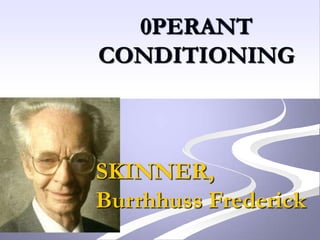
Operant conditioning - skinner
- 2. B F. Skinner Is Best Known For: Operant conditioning Schedules of Reinforcement ► He received a B.A. in English literature in 1926 from Hamilton College, and spent some time as a struggling writer before discovering the writings of Watson and Pavlov. ► Inspired by these works, Skinner decided to abandon his career as a novelist and entered the psychology graduate program at Harvard University. ► In 1945, B.F. Skinner moved to Bloomington, Indiana and became Psychology Department Chair and the University of Indiana. In 1948, he joined the psychology department at Harvard University where he remained for the rest of his life. ► He became one of the leaders of BEHAVIORISM and his work contributed immensely to experimental psychology. He also invented the 'Skinner box,' in which a rat learns to obtain food by pressing a lever. 2
- 3. OPERANT - Any active behavior that operates upon the environment to generate consequences OPERANT CONDITIONING - The behavior is followed by a consequence, and the nature of the consequence modifies the organisms tendency to repeat the behavior in the future 3
- 4. OPERANT CONDITIONING -learning occurs as the result of consequences. The components of learning expand to include a key characteristic: REINFORCEMENT The new equation for learning now looks like this: Stimulus-Response-Reinforcement. 4
- 5. The Importance of Environment -we are not likely to deny that the world about us is important. -We may disagree as to the nature or extent of the control which it holds over us, but some control is obvious. -Behavior must be appropriate to the occasion. -Failure to keep in touch with reality leads to the kinds of difficulties often observed in psychotic behavior. -Even when a man is engaged in rejecting the world, in systematically reducing certain forms of its control over him, he is physically interacting with it. 5
- 6. TEMPORAL RELATIONSHIPS STIMULUS RESPONSE REINFORCEMENT 1. Certain events tend to occur together. 2. Certain activities of the organism effect certain changes in the environment. 3. Certain events are the occasions upon which certain actions effect certain changes in the environment. 6
- 7. Law of Effect & Operant Conditioning - Skinner introduced the term REINFORCEMENT into Thorndike’s Law of Effect. EXPERIMENT POSITIVE NEGATIVE LAW OF Thorndike’s The Strength of the The Strength of the EFFECT Puzzle Box connection is increased connection is with in the organisms decreased with in response is the organisms accompanied/followed response is by an annoying state accompanied /followed by an annoying state OPERANT Skinner’s Box Behavior which is Behavior which is CONDITIONING reinforced tends to not REINFORCED repeat accompanied by punishment is decreased with in the organisms 7 response
- 8. 0PERANT CONDITIONING vs. LAW OF EFFECT OPERANT CONDITIONING -Learning is based on the consequences of responding LAW OF EFFECT - Responses that leads to desirable effects are repeated; those that produce undesirable results are not 8
- 9. ABC’s Of Operant Conditioning A-ntecedent B-ehavior C-onsequences 9
- 10. EXPERIMENTS - A cage that has a bar pedal on one wall that when pressed, causes a little mechanism to release a food pellet into the cage 10
- 11. 11
- 12. Rats & Pigeons RATS- response levers Pigeons- response keys w/ a switch SKINNER’S OBSERVATION DEPENDENT VARIABLES Measures of learning 1. Acquisition Rate - How rapidly an animal can be trained to a new operant behavior as a function of reinforcement 12
- 13. SKINNER’S OBSERVATION 2. RATE OF RESPONSE 13
- 14. 14
- 15. SKINNER’S OBSERVATION 3. EXTINCTION RATE TYPES OF REINFORCEMENT 1. PRIMARY - Instinctive Behaviors lead to satisfaction of basic survival needs 2. SECONDARY -Becomes reinforcing when paired w/ primary reinforcer 3. GENERALIZED - Under more than 1 set of circumstances through association w/ more than 1 primary reinforcer 15
- 16. OUTCOME OF OPERANT CONDITIONING 16
- 17. PRINCIPLES OF OPERANT CONDITIONING Reinforcement Positive Reinforcers Negative Reinforcers WHY IS A REINFORCER REINFORCING? -an organism repeats a response because it finds the consequences "pleasant" or "satisfying.“ -an organism tends to approach or prolong it may be only another way of saying that the stimulus has reinforced the behavior of approaching or prolonging. 17
- 18. PRINCIPLES OF OPERANT CONDITIONING Punishment Positive Punishment Negative Punishment UNDESIRABLE EFFECTS OF PUNISHMENT 1. Responses only disappear temporarily 2. Emotional credispositions 3. Any behavior that reduces the aversive stimulation accompanying alibi 18
- 19. PRINCIPLES OF OPERANT CONDITIONING Shaping - Acquisition of complex behavior - Method of successive approximation Extinction - Elimination of behavior - Stopping reinforcement of the behavior 19
- 20. PRINCIPLES OF OPERANT CONDITIONING Generalization - A behavior may performed in more than 1 situation Descrimination - Learning that a behavior will be rewarded in 1 situation, but not another 20
- 21. APPLICATION OF OPERANT CONDITIONING TO LEARNING Children at all ages exhibit behavior Teachers & parents are behavior modifiers Requires the learner makes a response for every frame & receives immediate feedback 21
- 22. APPLICATION OF OPERANT CONDITIONING TO LEARNING Practice should take the form of question (stimulus) – answer(response) frames which expose the student to the subject in gradual steps Ensure that good performance in the lesson is paired with secondary reinforces 22
- 23. 23
